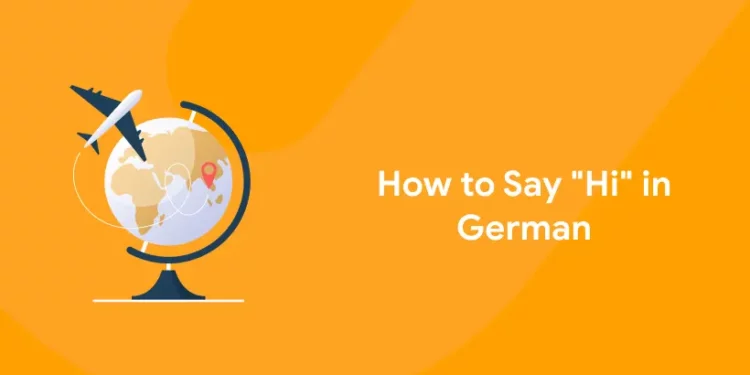Table of Contents
One of the first things you need to learn in every language you study is how to greet people. Knowing how to say “hello” and “goodbye” in German can be a great icebreaker, even if you’re not fluent in the language.
Learning German? Saying “hello” at the very beginning will help you establish rapport and start a discussion with native German speakers. You’ll learn how to say hi and many other greetings in German in this post.
Click here to join the Entri online German language course! Watch demo classes here!
How do you say “Hi” in German?
There are multiple ways to say “hello” in German. Saying “hi” or “hallo” is the most practical approach for an English speaker to greet someone. Although they both have a laid-back greeting style, some might not think it’s suitable to use them around older people or in more serious situations. Still, you’ll be understood by all. These two words could provide you with a wonderful opportunity to interact with locals if you are a beginner studying German and need some confidence.
Hi → Hi
Hallo → Hello
Guten Morgen → Good morning
Guten Tag → Good day
Guten Abend → Good evening
Gute Nacht → Good night
Formal Alternatives to say HI in German
1: How do you say "Good Morning" in German?
In German, Guten Tag is the formal go-to
“Guten Tag” (good day) is appropriate in situations when you may be interacting with strangers or acquaintances as long as the sun is shining. Additionally, you can switch to saying “guten Morgen” before noon or “guten Abend” after dusk until it’s time for bed.
Hallo is German for hello
Hallo is one of the numerous German words that have a sound that is very similar to its English equivalent. Although it’s not slang, this is the German word for “hello” and should only be used in informal situations.
Germany uses hi, too
This word has the same pronunciation in many different languages, making it a universal greeting. Similar to how it is in English, hi is even less formal than hallo and should only be spoken to people you feel comfortable around.
Open your casual convo with alles klar
If you say “alles klar” aloud to yourself, you can roughly understand what it means. It literally means “all’s clear,” and it’s used in the same sense as “what’s up?” to start a conversation. Therefore, save it in your pocket for folks you know well.
Wie geht es Ihnen? s a formal conversation starter with a caveat
Wie geht es Ihnen is a suitable opening if you need something more professional for a business situation. It’s not customary to enquire about someone’s well-being in passing, unlike in other cultures. Therefore, save this statement and its colloquial equivalent, wie geht’s, for initiating more in-depth conversations.
Use Germany’s jo! cautiously
Jo is the German equivalent of yo, exactly as it sounds. As one might anticipate, you should avoid bringing this up in casual discussions. Although that may be something the younger generation says to get attention, it most definitely does not correspond with the manners that most Germans demand.
How to Respond to Hi in German?
Wie geht es dir?/Wie geht’s?
“How’s it going?”
Despite being somewhat slang and informal, this is very frequently used. There’s even a formal variant, dir, which can be substituted with the formal Ihnen.
You are essentially asking, “How goes it to you?” Like in English, the appropriate response is gut, which means “good.” But you’re capable of more than that! Try these out:
Gut, danke! Und dir/Ihnen?
“Good, thanks! And you?”
Es geht mir sehr gut.
“I’m doing very well.”
These are great general answers, and the translation does a good job of capturing the appropriate level of formality. The statement “I’m doing very well” is a fantastic fit for the genuine question you would ask someone you haven’t seen in a while when you enquire about their well-being.
Hey, Alter!
“Hey, man!”
Yes, the Germans also say “hey.” There is English everywhere! Alter is a very informal and relaxed way to address a friend who is masculine. You can give it to him with a grin and a handshake when you meet him, or you can yell it across the room to grab his attention.
Was geht ab?
“What’s up?”
This expression is extremely slangy and really shouldn’t be used in a formal setting, much like its English version.
Practicing German Greetings: Tips and Exercises
Take Part in Everyday Discussions
Using German in regular conversations is one of the best ways to improve your speaking skills. Utilising German in real-world contexts, such as placing an order for coffee, requesting directions, or chatting about the weather, boosts confidence and solidifies language acquisition. As your comfort level rises, start with simpler statements and progressively get more complicated. This consistency converts theoretical knowledge into the capacity to talk with fluency.
Participate in German Language Meetups
One exciting method to practise speaking German is to go to German language gatherings. These gatherings of German language learners and native speakers frequently offer a comfortable setting for you to practise speaking the language. Meetups can range from official classes to casual talk hours and are usually held in places all over the world. In addition to improving your German, you may learn about the local customs and slang here.
Make Use of Apps for Language Learning
Language learning is now more accessible than ever thanks to technology. Talkpal AI and other interactive apps provide real-time talks with AI characters as a means of practicing speaking German. These tools are a priceless resource for students of all skill levels because they frequently use speech recognition to offer instant feedback on pronunciation and fluency. Through consistent use of these apps, you can improve your speaking and listening skills to a great extent.
Connect with German Media
Watching films, TV series, podcasts, and radio shows in German is a great method to get comfortable speaking the language. Listening to native speakers can help you become more comfortable with the language’s rhythm and flow while also helping with comprehension and pronunciation. To improve interest and learning effectiveness, try repeating words or having pretend conversations with the characters.
Start a Language Exchange
Practicing with a friend who speaks German well can be quite beneficial. When two or more speakers of different languages practise one other’s native tongues, it’s called a language exchange. With this arrangement, you can assist someone else in studying your language and get experience speaking German in a relaxed, friendly environment. It’s a win-win scenario that promotes language development and cross-cultural interaction.
Click here to join the Entri online German language course! Watch demo classes here!
Frequently Asked Questions
How do you greet someone in Germany?
“Guten Morgen” (Good morning), “Guten Tag” (Good day), “Hallo” (Hello), and “Wie geht es Ihnen?” are a few examples of common German greetings. (Hi), and “Auf Wiedersehen” (Farewell).
Do Germans say "Guten Tag"?
Good afternoon is another meaning of guten Tag, however Germans use it throughout the entire day.
How do I reply to a guten tag?
Good, danke. “Thanks, I’m fine.” At this point, you’re curious about their progress.
Do Germans say "have a good day"?
Many folks think it’s a little too formal and stiff these days. Saying “schönen Tag,” which is courteous to say to anyone, or the more colloquial “tschüss,” would be far more popular. One of the languages that English speakers find most easily learnt is German.










